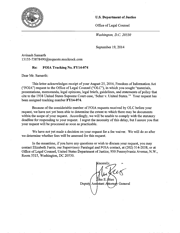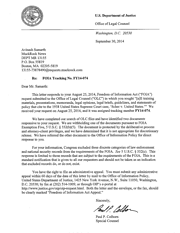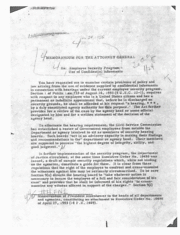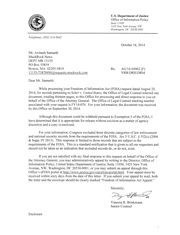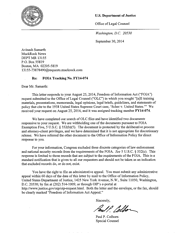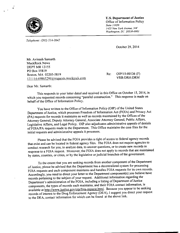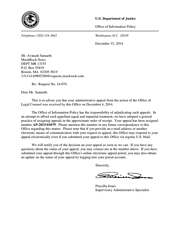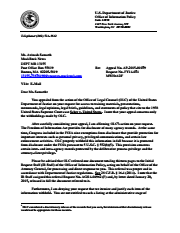Scher v. United States (Department of Justice, Office of Legal Counsel)
| Tracking # |
AP-2015-01079 ; 14-074 |
| Submitted | Aug. 25, 2014 |
MuckRock users can file, duplicate, track, and share public records requests like this one. Learn more.
Communications
From: Avinash Samarth
To Whom It May Concern:
This is a request under the Freedom of Information Act. I hereby request the following records:
All training materials, presentations, memoranda, legal opinions, legal briefs, guidelines, and statements of policy that cite to the 1938 United States Supreme Court case, "Scher v. United States."
I also request that, if appropriate, fees be waived as I believe this request is in the public interest. The requested documents will be made available to the general public free of charge as part of the public information service at MuckRock.com, processed by a representative of the news media/press and is made in the process of news gathering and not for commercial usage.
In the event that fees cannot be waived, I would be grateful if you would inform me of the total charges in advance of fulfilling my request. I would prefer the request filled electronically, by e-mail attachment if available or CD-ROM if not.
Thank you in advance for your anticipated cooperation in this matter. I look forward to receiving your response to this request within 20 business days, as the statute requires.
Sincerely,
Avinash Samarth
From: USDOJ-Office of Legal Counsel (SMO)
Dear Mr. Samarth,
Attached is the acknowledgement letter for your FOIA request No. FY 14-074.
Bette Farris
From: Farris, Bette (OLC)
Dear Mr. Samarth,
Attached is the response to your FOIA request No. 14-074.
Bette Farris
From: Department of Justice, Office of Information Policy
A copy of documents responsive to the request.
From: Department of Justice, Office of Information Policy
A cover letter granting the request and outlining any exempted materials, if any.
From: Avinash Samarth
Dear Ms. Harris,
Thanks very much for your response to my FOIA request, No. 14-074. Could you please give me a date by which I can expect the responsive document from the Office of Information Policy? And could you also please provide me with a contact at the Office of Information Policy who is handling this request?
Thank you again.
Sincerely,
Avinash Samarth
From: Farris, Bette (OLC)
Dear Mr. Samarth,
Please contact the Office of Information Privacy directly. I am including the link to their FOIA website. http://www.justice.gov/oip/submit-and-track-request-or-appeal
Bette Farris
From: MuckRock
To Whom It May Concern:
The attached FOIA request has been referred to your office for processing. An estimated date of completion would be greatly appreciated.
Thank you very much for your time.
From: Department of Justice, Office of Information Policy
A no responsive documents response.
From: Avinash Samarth
Director, Office of Information Policy
United States Department of Justice
Suite 11050
1425 New York Avenue, N.W.
Washington, D.C. 20530-0001
RE: FREEDOM OF INFORMATION ACT APPEAL, OLC FOIA REQUEST 14-074
To the Director:
This is an appeal under the Freedom of Information Act (“FOIA”), 5 U.S.C. § 552 et seq., concerning the Office of Legal Counsel’s (“OLC”) withholding of a document responsive to FOIA request 14-074.
By letter dated August 25, 2014, I requested “All training materials, presentations, memoranda, legal opinions, legal briefs, guidelines, and statements of policy that cite to the 1938 United States Supreme Court case, ‘Scher v. United States.’” The request was assigned number 14-074.
By letter dated September 30, 2014, the OLC stated that it found two responsive documents, but that it was withholding one document pursuant to Exemption 5 of the FOIA, 5 U.S.C. § 552(b)(5), because it believes that document to be “protected by the deliberative process and attorney-client privileges.” The OLC did not explain or describe why the withheld document qualifies under either privilege or why the exempted information cannot be redacted or segregated from the rest of the document.
I. DISCUSSION
a. The deliberative-process privilege was not adequately justified.
The OLC can only invoke the deliberative-process privilege to withhold a responsive document if it can demonstrate the document to be both predecisional and deliberative. Judicial Watch, Inc. v. FDA, F.3d 141, 151 (D.C. Cir. 2006); Mapother v. Dep’t of Justice, 3 F.3d 1533, 1537 (D.C. Cir. 1993). Documents that are both “pre-decisional” and “deliberative” are ones that are “generated before the adoption of an agency policy” and reflect the “give-and-take of the consultative process.” Id.
Therefore, the deliberative-process privilege does not protect “an agency’s final opinions, statements or policy and interpretations definitively adopted by the agency, and any documents having ‘the force and effect of law.’” Nat’l Wildlife Fed’n v. U.S. Forest Serv., 861 F.2d 1114, 1122 (9th Cir. 1988) (quoting NLRB v. Sears, Roebuck & Co., 421 U.S. 132, 153 (1975)). If the document withheld by the OLC is a “final opinion,” or a “statement,” “policy,” or “interpretation” that is definitively adopted, then it cannot be properly withheld under the deliberative-process privilege.
In invoking the deliberative-process privilege, the OLC must establish “what deliberative process is involved, and the role played by the documents in issue in the course of that process.” Coastal States Gas Corp. v. Dep’t of Energy, 617 F.2d 854, 867 (D.C. Cir. 1980). It does not suffice to simply declare that a record is both predecisional and deliberative. Judicial Watch, Inc., F.3d at 151. But the OLC has done only that – it has merely invoked the deliberative-process privilege by name. The agency did not specify any deliberative processes pursuant to which the document was withheld, nor did it specify what role, if any, the withheld document played in that process.
b. The attorney-client privilege was not adequately justified.
The OLC’s refusal to disclose the requested item can be upheld under attorney-client privilege only if the OLC can show that the withheld document was “a communication between client and counsel … made for the purpose of obtaining or providing legal assistance.” In re County of Erie, 473 F.3d 413, 418-19 (2d Cir. 2007) (emphasis added). In other words, communications between two government employees cannot be withheld under attorney-client privilege unless one of those employees was a client seeking legal assistance from the other. In its response, the OLC did not make a showing that the withheld document contains information to a client that was made for the purpose of providing or obtaining legal assistance.
Moreover, if the contents of the withheld document have in any way been incorporated into government policy, that document is not exempt from disclosure under FOIA for reasons of inter- or intra- agency guidance, and must therefore be made available. See Nat’l Council of La Raza v. Dep’t of Justice, 411 F.3d 350 (2d Cir. 2005). The OLC did not specify that the contents of the withheld document have not been in any way incorporated into government policy.
II. CONCLUSION
Unless you determine that the withheld document is both predecisional and deliberative, or you determine that the OLC’s device has not been incorporated into governmental policy, I ask that the Office of Information Policy reverse the OLC’s partial denial of FOIA request 14-074 and disclose the withheld document.
Federal agencies have a statutory duty to disclose any “reasonably segregable” non-exempt portions of withheld responsive documents. E.g., EPA v. Mink, 410 U.S. 73, 91 (1973); 5 U.S.C. § 552(b) (“[a]ny reasonably segregable portion of a record shall be provided to any person requesting such record after deletion of the portions which are exempt under this subsection.”). In the alternative to disclosing the document, I request that you thoroughly review the withheld document for any portions that do not qualify under either the deliberative or attorney-client privileges.
As a last resort, because the OLC has withheld a responsive document without providing a general characterization of that document, I request that you provide a written description of the document, as suggested by Vaugh v. Rosen, 484 F.2d 820, 827 (D.C. Cir. 1973). Although such a description is not required in the administrative stage of processing, providing one will work towards the President’s promise of transparency. See Transparency and Open Government, Whitehouse.gov, http://www.whitehouse.gov/the_press_office/TransparencyandOpenGovernment (last visited Nov. 24, 2014).
In the event that this appeal is denied in part or in full, please provide a written response describing the reasons for the denial, and the names and titles of each person responsible for the denial.
Sincerely,
Avinash Samarth
From: OIP-NoReply
THIS MESSAGE IS SENT FROM AN UNATTENDED ID. DO NOT REPLY TO THIS MESSAGE.
From: OIP-NoReply
Files
pages
